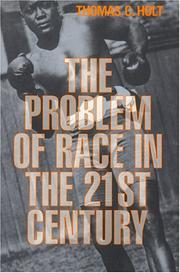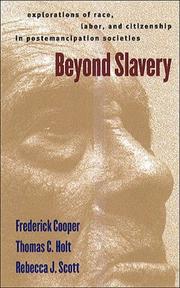| Listing 1 - 10 of 12 | << page >> |
Sort by
|

ISBN: 0674004434 0674008243 0674038754 0674264533 Year: 2000 Publisher: Cambridge, Mass. Harvard University Press
Abstract | Keywords | Export | Availability | Bookmark
 Loading...
Loading...Choose an application
- Reference Manager
- EndNote
- RefWorks (Direct export to RefWorks)
"The problem of the twentieth century is the problem of the color-line," W. E. B. Du Bois wrote in 1903, and his words have proven sadly prophetic. As we enter the twenty-first century, the problem remains--and yet it, and the line that defines it, have shifted in subtle but significant ways. This brief book speaks powerfully to the question of how the circumstances of race and racism have changed in our time--and how these changes will affect our future. Foremost among the book's concerns are the contradictions and incoherence of a system that idealizes black celebrities in politics, popular culture, and sports even as it diminishes the average African-American citizen. The world of the assembly line, boxer Jack Johnson's career, and The Birth of a Nation come under Holt's scrutiny as he relates the malign progress of race and racism to the loss of industrial jobs and the rise of our modern consumer society. Understanding race as ideology, he describes the processes of consumerism and commodification that have transformed, but not necessarily improved, the place of black citizens in our society. As disturbing as it is enlightening, this timely work reveals the radical nature of change as it relates to race and its cultural phenomena. It offers conceptual tools and a new way to think and talk about racism as social reality.
Sociology of minorities --- Race. --- Racism.
Book
ISBN: 0674038754 9780674038752 0674264533 Year: 2022 Publisher: Cambridge, MA
Abstract | Keywords | Export | Availability | Bookmark
 Loading...
Loading...Choose an application
- Reference Manager
- EndNote
- RefWorks (Direct export to RefWorks)
"The problem of the twentieth century is the problem of the color-line," W. E. B. Du Bois wrote in 1903, and his words have proven sadly prophetic. As we enter the twenty-first century, the problem remains--and yet it, and the line that defines it, have shifted in subtle but significant ways. This brief book speaks powerfully to the question of how the circumstances of race and racism have changed in our time--and how these changes will affect our future. Foremost among the book's concerns are the contradictions and incoherence of a system that idealizes black celebrities in politics, popular culture, and sports even as it diminishes the average African-American citizen. The world of the assembly line, boxer Jack Johnson's career, and The Birth of a Nation come under Holt's scrutiny as he relates the malign progress of race and racism to the loss of industrial jobs and the rise of our modern consumer society. Understanding race as ideology, he describes the processes of consumerism and commodification that have transformed, but not necessarily improved, the place of black citizens in our society. As disturbing as it is enlightening, this timely work reveals the radical nature of change as it relates to race and its cultural phenomena. It offers conceptual tools and a new way to think and talk about racism as social reality.
Race. --- Racism. --- Bias, Racial --- Race bias --- Race prejudice --- Racial bias --- Prejudices --- Anti-racism --- Critical race theory --- Race relations --- Physical anthropology

ISBN: 0801842166 0801842913 Year: 1992 Publisher: Baltimore (Md.) : Johns Hopkins university press,
Abstract | Keywords | Export | Availability | Bookmark
 Loading...
Loading...Choose an application
- Reference Manager
- EndNote
- RefWorks (Direct export to RefWorks)
Capitalism --- Indigenous peoples --- Peasants --- Plantations --- Slavery --- History. --- History --- Jamaica --- Great Britain --- Race relations --- Politics and government --- Colonies
Multi
ISBN: 9780674038752 Year: 2022 Publisher: Cambridge, Mass. Harvard University Press
Abstract | Keywords | Export | Availability | Bookmark
 Loading...
Loading...Choose an application
- Reference Manager
- EndNote
- RefWorks (Direct export to RefWorks)
Book
ISBN: 2348068753 Year: 2021 Publisher: Paris (9bis, rue Abel Hovelacque 75013) : La Découverte,
Abstract | Keywords | Export | Availability | Bookmark
 Loading...
Loading...Choose an application
- Reference Manager
- EndNote
- RefWorks (Direct export to RefWorks)
À la fois concis et ambitieux, ce livre retrace l'histoire de la lutte des Noirs américains pour l'égalité et la citoyenneté dans les années 1950 et 1960. S'émancipant d'une histoire focalisée sur les figures iconiques comme Rosa Parks ou Martin Luther King, Thomas Holt propose une histoire from below (« par en bas ») qui met les anonymes au centre de la narration pour mieux restituer les logiques profondes du « Mouvement ». Symboliquement, l'auteur débute son récit en 1944 par le geste de sa propre grand-mère Carrie s'asseyant à l'avant d'un bus, espace réservé aux Blancs. Loin d'en faire une héroïne, l'auteur rappelle qu'il y eut de nombreux actes de rébellion semblables. Ces multiples actions individuelles, souligne-t-il, permirent l'émergence du Mouvement des droits civiques qui allait s'épanouir au cours de la décennie suivante. À côté d'un récit précis des faits majeurs, Thomas Holt montre donc que la résistance a été animée avant tout par des citoyens ordinaires, souvent des femmes, ouvrant la voie aux mouvements féministes de l'après-Seconde Guerre mondiale. Cet ouvrage constitue un apport précieux à l'étude des résistances à l'oppression raciale et une boussole pour penser notre présent et envisager l'avenir.
Book

ISBN: 1469607247 146960793X 9781469607931 9781469607245 9781469607221 1469607220 9781469607238 1469607239 9798893132434 Year: 2013 Publisher: Chapel Hill
Abstract | Keywords | Export | Availability | Bookmark
 Loading...
Loading...Choose an application
- Reference Manager
- EndNote
- RefWorks (Direct export to RefWorks)
There is no denying that race is a critical issue in understanding the South. However, this concluding volume of The New Encyclopedia of Southern Culture challenges previous understandings, revealing the region's rich, ever-expanding diversity and providing new explorations of race relations. In 36 thematic and 29 topical essays, contributors examine such subjects as the Tuskegee Syphilis Study, Japanese American incarceration in the South, relations between African Americans and Native Americans, Chinese men adopting Mexican identities, Latino religious practices, and so on.
Asian Americans --- Hispanic Americans --- African Americans --- Hispanics (United States) --- Latino Americans --- Latinos (United States) --- Latinxs --- Spanish Americans in the United States --- Spanish-speaking people (United States) --- Spanish-surnamed people (United States) --- Ethnology --- Latin Americans --- Spanish Americans (Latin America) --- Asians --- Afro-Americans --- Black Americans --- Colored people (United States) --- Negroes --- Africans --- Blacks --- Southern States --- American South --- American Southeast --- Dixie (U.S. : Region) --- Former Confederate States --- South, The --- Southeast (U.S.) --- Southeast United States --- Southeastern States --- Southern United States --- United States, Southern --- Social conditions --- Ethnic relations --- Race relations

ISBN: 0807825417 0807848549 9780807848548 1469617374 9798890872265 Year: 2014 Publisher: Chapel Hill : University of North Carolina Press,
Abstract | Keywords | Export | Availability | Bookmark
 Loading...
Loading...Choose an application
- Reference Manager
- EndNote
- RefWorks (Direct export to RefWorks)
In this collaborative work, three leading historians explore one of the most significant areas of inquiry in modern historiography--the transition from slavery to freedom and what this transition meant for former slaves, former slaveowners, and the societies in which they lived. Their contributions take us beyond the familiar portrait of emancipation as the end of an evil system to consider the questions and the struggles that emerged in freedom's wake. Thomas Holt focuses on emancipation in Jamaica and the contested meaning of citizenship in defining and redefining the concept of freedom; Rebecca Scott investigates the complex struggles and cross-racial alliances that evolved in southern Louisiana and Cuba after the end of slavery; and Frederick Cooper examines the intersection of emancipation and imperialism in French West Africa. In their introduction, the authors address issues of citizenship, labor, and race, in the post-emancipation period and they point the way toward a fuller understanding of the meanings of freedom.
Citizenship. --- Freedmen. --- Race. --- Slaves --- Emancipation. --- Enslaved persons --- Freed persons.
Book

ISBN: 9781501734564 Year: 2019 Publisher: Ithaca, NY
Abstract | Keywords | Export | Availability | Bookmark
 Loading...
Loading...Choose an application
- Reference Manager
- EndNote
- RefWorks (Direct export to RefWorks)
Multi

ISBN: 9781501734564 Year: 2019 Publisher: Ithaca, N.Y. Cornell University Press
Abstract | Keywords | Export | Availability | Bookmark
 Loading...
Loading...Choose an application
- Reference Manager
- EndNote
- RefWorks (Direct export to RefWorks)
Book

ISBN: 9780691187341 Year: 2018 Publisher: Princeton, NJ
Abstract | Keywords | Export | Availability | Bookmark
 Loading...
Loading...Choose an application
- Reference Manager
- EndNote
- RefWorks (Direct export to RefWorks)
| Listing 1 - 10 of 12 | << page >> |
Sort by
|

 Search
Search Feedback
Feedback About UniCat
About UniCat  Help
Help News
News